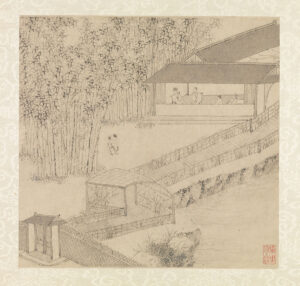
- This event has passed.
Chinese Garden Poetry
April 25, 2022 @ 7:00 pm - 8:00 pm

To celebrate National Poetry Month, come learn about Chinese garden poetry and how to integrate this subject into the North Carolina curriculum for English and Language Arts.
This webinar will introduce the history and form of Chinese garden poetry, a classical form dating back centuries and reaching a new peak in the mid-Ming Dynasty (around the turn of the sixteenth century, CE). As a ritual practice started from Caowei (曹魏), garden poetry had been created to eulogize the artistic achievement and aesthetic taste of the garden owner. This tradition revived in the Ming dynasty because trade in salt and silk brought an economic revival to Southeastern China, especially around the city of Suzhou (苏州), providing the funds to reestablish great gardens and the leisure time for ministers or magistrates with adequate wealth to write poems inspired by these gardens. The webinar will first introduce Chinese gardens and garden poetry. It will then unpack the symbolic meanings in Chinese garden poetry, explaining the traditional meanings of elements such as lotus flowers, bridges, pavilions, and other elements of a traditional Suzhou garden (苏州园林). Finally, the webinar will provide guidance on how to teach Chinese garden poetry in the framework of the new North Carolina English and Language Arts standards for grades 9-10, with exercises like analyzing sample poems and supplementary materials including images and videos.
This webinar will be led by Kun Meng, a graduate student in the Department of Asian and Middle Eastern Studies at UNC-Chapel Hill and the Carolina Asia Center’s Graduate Outreach Fellow 2021-22. Mr. Meng is researching Chinese poetry and paintings, and he brings experience working in the museum sector in Shanghai.
Please register to attend this Zoom webinar by clicking this link.
Related Events
The Carolina Asia Center supports diverse Asia-related events. However, CAC co-sponsorship of any talk, seminar, documentary screening, film screening, performance or celebration does not constitute endorsement of or agreement with the views presented therein. As an academic institution, we value diverse perspectives that promote dialogue and understanding.

